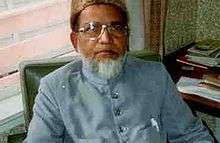Islam in New Zealand
Islam in New Zealand is a minority religious affiliation. Small numbers of Muslim immigrants from South Asia and eastern Europe settled in New Zealand from the early 1900s until the 1960s. Large-scale Muslim immigration began in the 1970s with the arrival of Fiji Indians, followed in the 1990s by refugees from various war-torn countries. The first Islamic centre opened in 1959 and there are now several mosques and two Islamic schools. The majority of the Muslims are Sunni, with a large minority Shia and some Ahmadi Muslims, who run the largest mosque in the country.[1] Islam is estimated to be the fastest growing religion among Māori.[2]
History
The first Muslims in New Zealand were an Indian family who settled in Cashmere, Christchurch, in the 1850s.[3] The 1874 government census reported 15 Chinese gold diggers working in the Dunstan gold fields of Otago in the 1870s.[4][5] In the early 1900s three important Gujarati Muslim families came from India. The first Islamic organisation in New Zealand, the New Zealand Muslim Association (NZMA), was established in Auckland in 1950. In 1951 the refugee boat SS Goya brought over 60 Muslim men from eastern Europe, including Mazhar Krasniqi who would later serve twice as president of the New Zealand Muslim Association. These Gujarati and European immigrants worked together in the 1950s to buy a house and convert it into an Islamic centre in 1959. The following year saw the arrival of the first imam, Maulana Said Musa Patel, from Gujarat, India. Students from South Asia and Southeast Asia helped establish the other prayer rooms and Islamic centres elsewhere from the 1960s onwards, although New Zealand had a relatively tiny Muslim population until many years later.
In April 1979, Mazhar Krasniqi brought together the three regional Muslim organisations of Canterbury, Wellington and Auckland, to create the only national Islamic body – the Federation of Islamic Associations of New Zealand (FIANZ). He was honoured for his efforts by the New Zealand government in 2002, receiving a Queens Service Medal.[6] Later Dr Hajji Ashraf Choudhary served as president (1984–85) before pursuing a political career and entering the New Zealand parliament in 1999.
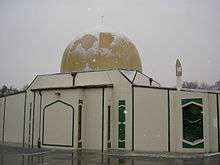
Large-scale Muslim immigration began with the arrival of mainly working class Indo-Fijians in the 1970s. They were followed by professionals after the first Fiji coup of 1987. Early in the 1990s many migrants were admitted under New Zealand's refugee quota, from war zones in Somalia, Bosnia, Afghanistan, Kosovo and Iraq. There are also a significant number of Muslims from Iran who live in New Zealand.
In 1981 Sheikh Khalid Hafiz was appointed Imam of Wellington, a post he held until his death in 1999, and was employed as imam by the International Muslim Association of New Zealand. Soon after his arrival he was also appointed senior religious adviser to the Federation of Islamic Associations of New Zealand.
The majority of New Zealand Muslims are Sunnis but there is a large number of Shias who live in New Zealand, concentrated mainly in Auckland (the largest city of New Zealand). In recent years Shiah have become active holding Ashura commemoration programmes in Auckland parks. The first of these was conducted by the Fatima Zahra Charitable Association on 19 January 2008.[8]
Contemporary Islam
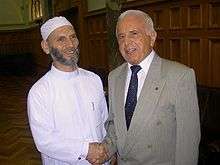
The number of Muslims in New Zealand according to the 2013 census is 46,149, up 28% from 36,072 in the 2006 census.[9] New Zealand now has a number of mosques in the major centres, and two Islamic schools (Al Madinah and Zayed College for Girls).
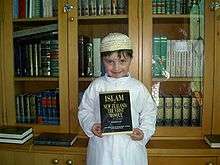
The community is noted for its harmonious relations with the wider New Zealand community, with various interfaith efforts from all sides contributing to this situation. FIANZ established the Harmony Awards as part of Islam Awareness Week in 2008 to recognise the contributions of New Zealanders to improving understanding and relationships between Muslims and the wider community.[10]
The Muslim Students and Youth Association of NZ was formed in 1997. It is affiliated to Federation of Islamic Associations of New Zealand. It is primarily run by university students and other youth. They undertake regular activities including lectures, sports tournaments and Muslim youth camps, and work with FIANZ who organise the annual Islam Awareness Week (IAW).
There are significant communities of Muslims from Middle East (Turkey and Lebanon), the South Asia (Pakistan, India and Bangladesh) and Southeast Asia. There is also a large Indo-Fijian Muslim community and an equally substantial Somali minority in New Zealand. Contrary to popular assertions from various community leaders, no one single ethnic group can claim to contribute more than half of the New Zealand Muslim population. The majority of Muslims in New Zealand are concentrated in the major cities of Auckland, Hamilton, Wellington, and Christchurch. In recent years an influx of Malay students from Malaysia and Singapore has increased the proportion of Muslims in some other centres, notably the university city of Dunedin. Dunedin's Al-Huda mosque is reputedly the world's southernmost, and is further from Mecca than any mosque in the Southern Hemisphere.
Māori Muslims
Islam is estimated to be the fastest growing religion among the Māori,[11][2] with census figures showing the number of Muslims of Māori ethnicity increasing from 99 to 708 in the 10 years to 2001,[12][13] and to 1,083 by 2013 census data.[9] The Aotearoa Māori Muslim Association (AMMA), the most influential Māori Muslim movement, views tino rangatiratanga as a form of jihad, and Islam the perfect vehicle for Māori nationalism.[14] The leader of the AMMA, Sheikh Eshaq Te Amorangi Morgan Kireka-Whaanga was recently identified among the top 500 most influential Muslims.[15] In 2004 Sheikh Eshaq led the Quran Tilawat at the "National Islamic Converts Conference" at the Canterbury mosque in Christchurch. The Ahmadiyya Muslim Community has translated the Qur'an into the Māori language, Te Reo.[16]
Pacific Islanders
While the overall Pacific Islander community grew 15% according to census data from 2001 to 2006, Muslim Pacific Islanders grew 87.43%.[2] According to 2013 census data, there were 1,536 Muslims among the Pacific islander community (a little under 3.5% of New Zealand's Muslim population).[9] The most famous Muslim from this community is rugby player and heavyweight boxer, Sonny Bill Williams.[17]
Europeans
According to 2013 census data, there were 4,353 Muslims (about 9.5% of the total Muslim population) among the European community (Pākehā).[9]
Notable New Zealand Muslims
- Sonny Bill Williams,rugby player.
- Joel Hayward, scholar, writer and poet.
- Abdul Rahim Rasheed, activist.
Issues
Muhammad cartoons controversy
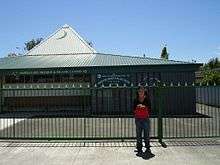
In 2006, two newspapers in New Zealand decided to republish controversial Danish cartoons depicting Muhammad, the prophet of Islam. The Muslim community registered its displeasure through press statements and a small peaceful march in Auckland. The editors said they did not mean offence but would not back down. Prime Minister Helen Clark and opposition leader Don Brash both made statements that the cartoons were not appreciated if they deeply offended members of the New Zealand community, but that such decisions were for editors to make, not politicians. Muslim leaders and the editors got together with the Race Relations office, and Jewish and Christian representatives in Wellington. As a result of this meeting the editors said they would not apologise but in good faith would refrain from publishing the offending images again. The New Zealand Muslim leadership, through the Federation of Islamic Associations of New Zealand (FIANZ), then proceeded in good faith to consider the matter closed, and drafted letters to 52 Muslim countries reversing their earlier stance and asking that New Zealand products not be boycotted.[18][19]
Radical Islam
In November 2016, Mohammad Anwar Sahib, the Imam of the Al-Taqwa mosque in Manukau, Auckland and a religious adviser to the FIANZ, drew controversy when he made offensive remarks about Jews, Christians, and women in a series of speeches that were posted by the right-wing blogger Cameron Slater on YouTube. Sahib's comments were condemned by a wide range of figures and groups in New Zealand society including the FIANZ's President Hazim Arafeh, the Islamic Women's Council of New Zealand (IWCNZ), the Race Relations Commissioner Dame Susan Devoy, the Ethnic Communities Minister Sam Lotu-Iiga, the ACT party David Seymour, the New Zealand First leader Winston Peters, the New Zealand Jewish Council, and the Ahmadiyya community.[20][21][22] In response to negative publicity, Sahib was dismissed from his advisory position at the FIANZ. Sahib denied accusations of racism and issued a statement claiming his statements had been taken out of context.[23][21]
In late October 2017, it was reported in the media that the first secretary of the Iranian Embassy Hormoz Ghahremani, the visiting Iranian cleric Hojatoleslam Shafie, and community elder Sayed Taghi Derhami had made remarks denying the Holocaust and attacking Israel at the Shia Islamic Ahlulbayt Foundation in Pakuranga, Auckland during a meeting to commemorate Quds Day in June. A video of the speeches had been posted on the Foundation's YouTube channel. These remarks were criticized by the New Zealand Jewish Council and the pro-Israel think tank the Israel Institute of New Zealand, who advocated Ghahremani's expulsion. Ghahremani later clarified that his actions represented the Iranian government's official position on Israel.[24][25] Race Relations Commissioner Devoy also condemned the trio's anti-Semitic statements.[26] The opposition New Zealand National Party's foreign affairs spokesperson Gerry Brownlee also urged the incumbent Labour-New Zealand First-Green coalition government to expel Ghahremani. In response, Foreign Minister Winston Peters countered that the incident had occurred under the previous National government's watch. Peters indicated that the Ministry of Foreign Affairs and Trade had summoned Ghahremani to express its disapproval.[27][28]
See also
Notes and references
- ↑ "Prayers for Opening". stuff.co.nz. October 31, 2013. Retrieved March 4, 2014.
- 1 2 3 Onnudottir, Helena; Possamai, Adam; Turner, Bryan (2012). "Islam and Indigenous Populations in Australia and New Zealand". Muslims in the West and the Challenges of Belonging: 60–86. Retrieved 10 March 2017.
- ↑ Abdullah Drury, "Mostly Harmless", Waikato Islamic Studies Review, Vol. 1, No. 1, March 2015, page 30.
- ↑ "Abdullah Drury: Crucial element locked in past", NZ Herald
- ↑ "New Zealand, Trade and the Muslim World Forum Speech", Pansy Wong
- ↑ "Home country doctrine splits once-unified local Muslims", Abdullah Drury
- ↑ "Masjid An-Nur in Riccarton, Canterbury". www.salatomatic.com. Salatomatic - your guide to mosques & Islamic schools. Retrieved 17 August 2017.
- ↑ "New Zealand Takes Ashura Outside for the First Time", by Fatima Zahra Charitable Association (Auckland, 20 January 2008)
- 1 2 3 4 "Kiwi converts among New Zealand's Muslim community". stuff.co.nz. Retrieved November 25, 2015.
- ↑ http://www.islamawareness.co.nz/harmony.html
- ↑ Bhandari, Neena (16 March 2009). "NEW ZEALAND: Asian Muslims Tell Their Own Stories". Retrieved 10 March 2017.
- ↑ "Religious affiliation", Table Builder, Statistics New Zealand
- ↑ Ruth Berry, Peters claims Muslim group funding radical in The New Zealand Herald (aa August, 2005)
- ↑ Hume, Tim (17 October 2004). "Muslim faith draws converts from NZ prisons (radical New Zealand Maori embrace jihad)". Stuff.co.nz.
- ↑ "The 500 Most Influential Muslims - 2010" by The Royal Islamic Strategic Studies Centre (Amman, 2010), page.129.
- ↑ "Koran's message of unity shared in te reo translation". April 15, 2010.
- ↑ "Sonny Bill Williams embraces Islam", Carolyne Meng-Yee, NZ Herald
- ↑ Zwartz, Barney (6 February 2006). "Cartoon rage spreads to New Zealand". The Age. Retrieved 3 November 2017.
- ↑ "Papers sorry for cartoons' offence". New Zealand Herald. 9 February 2006. Retrieved 3 November 2017.
- ↑ Palmer, Scott; Marbeck, Brian (22 November 2016). "'Hate Speech' Imam made a 'mistake' - FIANZ". Newshub. Retrieved 4 November 2017.
- 1 2 Bath, Brooke (22 November 2016). "Auckland Imam demands apology after backlash from anti-Semitic speeches". Stuff.co.nz. Retrieved 4 November 2017.
- ↑ "Dismissed Sheikh still in charge of At-Taqwa Mosque: A cause for concern". Shalom.Kiwi. Retrieved 4 November 2017.
- ↑ Martin, Hannah (23 November 2016). "Auckland Imam permanently stood down after anti-Semitic speeches". Stuff.co.nz. Retrieved 4 November 2017.
- ↑ Wall, Tony (29 October 2017). "Calls to expel Iran diplomat from NZ after fiery anti-Israel speech 'fuels radicalism'". Stuff.co.nz. Retrieved 4 November 2017.
- ↑ "Complaints laid after 'hate speech' calling Israel 'cancer', denying Holocaust". Newshub. 30 October 2017. Retrieved 4 November 2017.
- ↑ Devoy, Susan (31 October 2017). "'This is who we do not want to ever become': Dame Susan Devoy on anti-Semitism in New Zealand". The Spinoff. Retrieved 4 November 2017.
- ↑ Jones, Nicholas (3 November 2017). "Expel 'hateful Iranian diplomat: National". New Zealand Herald. Retrieved 4 November 2017.
- ↑ Kirk, Stacey (3 November 2017). "Opposition calls on Foreign Minister Winston Peters to expel 'hateful' Iranian diplomat". Stuff.co.nz. Retrieved 4 November 2017.
Further reading
- Drury, Abdullah (2006). Islam in New Zealand. ISBN 978-0-473-12249-2.
- Drury, Abdullah, Islam in New Zealand: The First Mosque (Christchurch, 2007) ISBN 978-0-473-12249-2
- Drury, Abdullah, "A time for Muslims to examine faith" in The Nelson Mail (5 August 2008), p. 9.
- Drury, Abdullah, "A Tribute to the Illyrian Pioneers" in Al Mujaddid (March 2002 - Muharram 1423), Vol.1, No.16, p. 10.
- Drury, Abdullah, "Crucial element locked in past " in The New Zealand Herald (25 September 2007).
- Drury, Abdullah, "Halal certification of growing value" in The Otago Daily Times (27 April 2007), p. 30.
- Drury, Abdullah, "Home country doctrine splits once-unified local Muslims" in The New Zealand Herald (12 July 2006).
- Drury, Abdullah, "Integration effort needed" in The Press (2 August 2005), p. 5.
- Drury, Abdullah, "Once Were Mahometans: Muslims in the South Island of New Zealand, mid-19th to late 20th century, with special reference to Canterbury" (University of Waikato, MPhil, 2016), Hamilton.
- Drury, Abdullah "Mahometans on the Edge of Colonial Empire: Antipodean Experiences" in Islam and Christian–Muslim Relations, Volume 29, Issue 1, pp. 71-87.
- Kolig, Erich, New Zealand's Muslims and Multiculturalism (2010) ISBN 978-90-04-17835-9.
- Sheppard, William, "The Muslim Community in New Zealand", Chapter 5 in Indians in New Zealand, ed. K.N. Tiwari (Wellington, N.Z.: Price-Milburn, 1980).
- Sheppard, William, "Muslims in New Zealand", The Journal of the Institute of Muslim Minority Affairs (Riyadh), 4/1-2 (1982): 60–81.
- Sheppard, William, "The Islamic Contribution: Muslims in New Zealand", in Religion in New Zealand Society, Second Edition, eds Brian Colless & Peter Donovan (Palmerston North, New Zealand: Dunmore Press, 1985), pp. 181–213.
- Sheppard, William, "Muslims in New Zealand", The Journal of the Institute of Muslim Minority Affairs (Riyadh), 16/2 (1996): 211–232. [Updates 1982 article to 1991.]
- Sheppard, William, "Australia and New Zealand", authored jointly with Michael Humphrey, in Islam Outside the Arab World, eds. David Westerlund and Ingvar Svanberg, Surrey: Curzon Press, 1999, pp. 278–294.
- Sheppard, William, "Muslims in New Zealand" in Muslim Minorities in the West: Visible and Invisible, eds., Yvonne Y. Haddad and Jane I. Smith, Walnut Creek, etc.: Altamira Press, 2002, chapter 13.
- Sheppard, William, "New Zealand’s Muslims And Their Organisations" New Zealand Journal of Asian Studies 8, 2 (December, 2006): 8–44. (cf. "Introduction: Muslims In New Zealand" in the next section)
- Sheppard, William, "Introduction: Muslims In New Zealand", New Zealand Journal of Asian Studies 8, 2 (December, 2006): 1–7. Co-authored with Erich Kolig.
- Sheppard, William, "Australia and New Zealand", in The Oxford Encyclopaedia of the Modern Islamic World (New York and Oxford: Oxford University Press, 1995), Vol. 1, pp. 154–5.
- "Sonny Bill Williams embraces Islam" in The Star, 16 February 2011, page.1.

